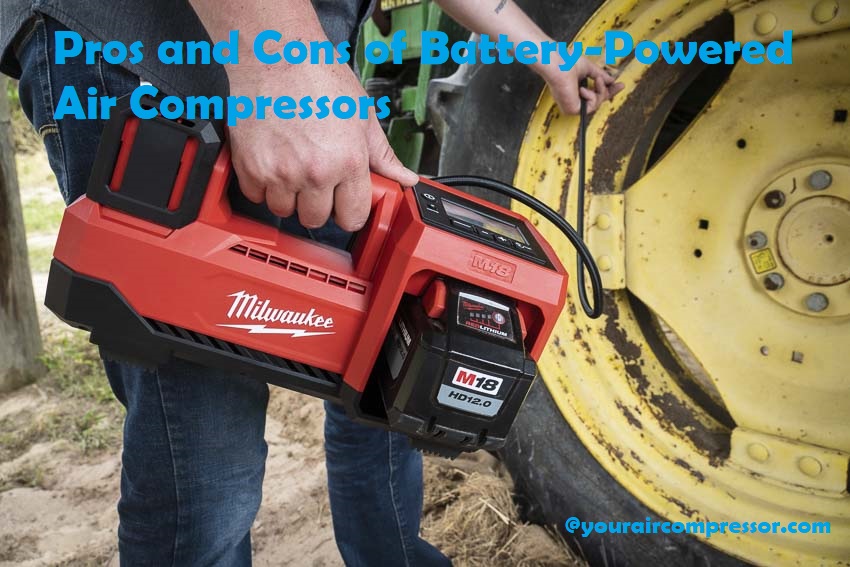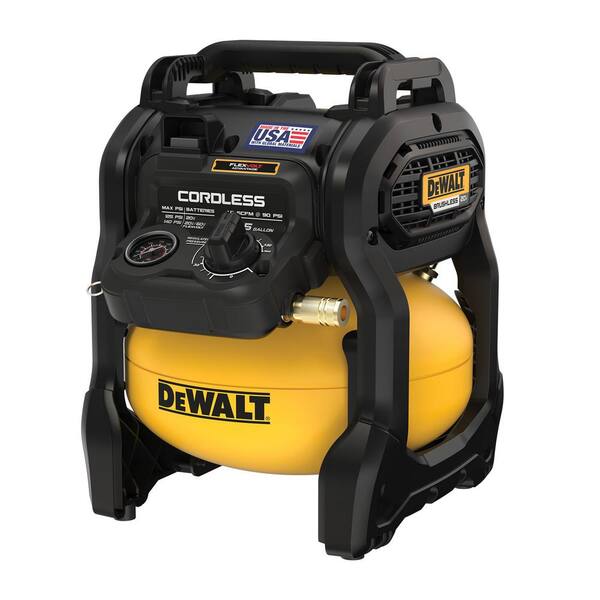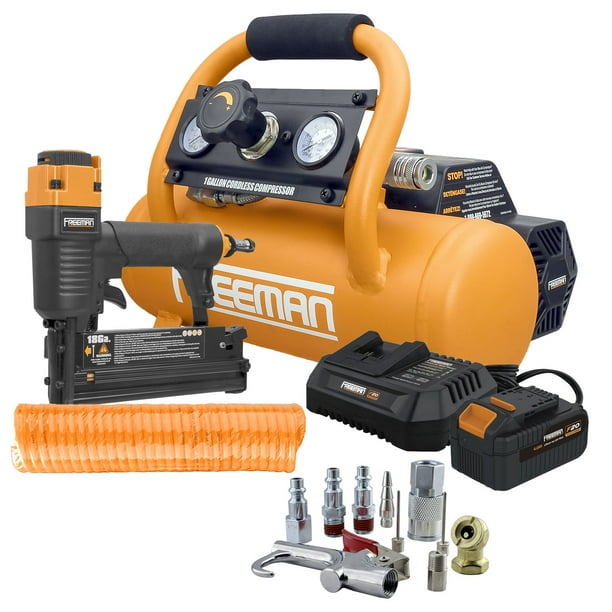Tired of dealing with the hassles of a corded air compressor? You may be considering battery-powered alternatives. Before you make the switch, check out this guide to the pros and cons of battery-powered air compressors.
Understand the benefits and potential drawbacks to make an informed decision.
An air compressor is a device that stores energy in the form of pressurized air and then uses this energy to power a wide range of tools and equipment, including pneumatic hammers and nail guns. They can be powered either by electricity or through a battery-powered model, and are used in many different industries including auto mechanics, home improvement, plumbing, landscaping and construction.
In this article, we will look at the pros and cons of both types of air compressors so that you can decide which one is right for your needs. We will discuss the advantages of battery-powered models over electric ones and then explore their drawbacks as well. Finally, we will examine some safety precautions to take when using an air compressor.
Definition of battery-powered air compressors
A battery-powered air compressor is an air-compressors powered by a rechargeable battery source instead of a standard electrical plug-in. It is a device that compresses atmospheric air, which can then be used for various tasks such as inflating tires, filling paintball guns, cleaning carpets and powering pneumatic tools. Due to the size and portability of battery-powered air compressors, they are typically used where an electric outlet or connection isn’t readily available or accessible.
The primary components of a battery-powered air compressor are the power source (battery), a motor that powers the compressor unit, an electronic control module to regulate pressure and performance, and a reservoir tank for collecting compressed air. The reservoir tank is commonly filled with oil mixture so when the motor runs it provides lubrication for engine parts during operations. Battery powered compressors are simpler in design than their electric counterparts since there is no need for extra attachments like cables or hoses. They also tend to be lighter in weight due to their lack of cords and plugs. However, their main drawback is that they are not able to produce large volumes of compressed air as compared to electric powered versions due to the limited power output of batteries.
Importance of battery-powered air compressors
Battery-powered air compressors have many advantages that make them an attractive option for a number of applications. The most obvious benefit is their portability. Unlike larger, gas-powered models, battery-powered versions can be taken where you need them without the hassle of dragging a bulky compressor around with you.
Battery-powered air compressors are often much quieter than traditional compressors and offer more precise air pressure control. The battery life on these units is typically longer than that of gas-powered models, which makes them a great choice for longer jobs or those in remote areas. Additionally, the cost of operating these machines is generally lower due to their energy efficiency and lack of fuel costs.
Pros of battery-powered air compressors
Battery-powered air compressors offer a variety of advantages and drawbacks. Before investing in one, it is important to consider how it will fit in with your intended use, and whether or not the pros outweigh the cons.
The biggest advantage of battery-powered air compressors may be their convenience. Without being tethered to a power source they are easy to transport, making them excellent options for regular on-site jobs. This type of compressor is also often quieter than standard models, making them ideal for indoor use or on sites with noise restrictions. Similarly, battery-powered models typically require less maintenance than traditional gasoline powered alternatives as there is no fuel tank or oil filter to maintain.
Battery-powered air compressors offer many benefits over traditional compressors but they do have some drawbacks that should be considered before purchasing one. The main factor that can limit their usefulness is battery life; since storage and usage requirements vary from model to model this may be an issue if extended periods of power are needed during a job. Additionally, higher amperage batteries will require longer charge times than those with lower ratings; this could cause issues if large projects need to be completed quickly or delays are not an option on the job site. Despite these drawbacks, battery-powered air compressors remain some of most popular styles due to their portability and convenience in demanding environments.
Portability
Battery-powered air compressors boast the ultimate in portability due to the fact that they run on electricity from a rechargeable battery, meaning that they can be packed up and taken along wherever your work requires you to go. This makes them ideal for use in remote locations or for tackling jobs on the move where traditional mains powered units would not have access to a power supply.
Furthermore, due to their light weight and compact size, battery-powered air compressors are perfect for jobs at heights, under cars or even underwater in swimming pools. The only downside of battery-powered air compressors is that their small size limits their pressure capacity, meaning they may not be suitable for more intensive applications such as metalworking or carpentry.
No need for electricity
Battery-powered air compressors offer numerous practical benefits, one of the most important being that they are not limited to power points when it comes to use. This also means that they can be taken and used in remote locations or those with less accessibility to power.
With the versatile and durable nozzles provided in many kits, you can easily access any hard-to-reach spot, allowing you to use the battery powered compressor with maximum speed and efficiency. Additionally, there is no need for scheduling regular maintenance checks as these machines require minimal and simple maintenance. In this way, operating costs can be managed effectively.
The on board LED display informs users about battery charge status ensuring that operations run with minimum input from the user.
Quieter operation

Battery-powered air compressors are well known for their quieter operation when compared to traditional air compressors. This is because they do not have the internal combustion engine drive commonly found in other models. Battery-powered air compressors rely solely on electric current from their batteries in order to power mechanical operations like a conventional compressor, allowing use without making excess noise.
This makes them ideal for use in homes and offices where excessive noise can be disruptive, as well as in outdoor spaces where noise can startle animals and other wildlife. When operated with proper ventilation, there is minimal emittance of any fumes or smoke which can often be more of an issue than sound when it comes to air compressors.
Factors to consider when purchasing a battery-powered air compressor
When Shopping for a battery-powered air compressor, there are a few key factors to consider. This section will provide comprehensive information on the different factors you should keep in mind when purchasing a compressor.
1) Battery: As the name implies, most battery-powered air compressors use an electrical battery as its source of power. The size of the battery and its capacity will vary depending on the type of compressor you purchase and how much power it requires to run efficiently. Be sure to check the total runtime when selecting your model for accurate estimates of usage times.
2) Costs: Battery-powered air compressors may be more expensive than their electric-powered counterparts, but they make up for that in convenience and portability. Additionally, owning a battery-operated air compressor is often considered an investment, since they require less maintenance due to fewer moving parts and tend to last longer than traditional electric models.
3) Components: Consider how much lubrication is required to maintain your model’s functionality as well as what type of replacement parts are available should any issues arise with your unit down the road. Additionally, some models come with additional features such as adjustable pressure settings that can customize for certain applications which can be beneficial depending on what tasks you plan to use it for.
4) Specialty Uses: Some air compressors are designed specifically for certain uses with specialized features tailored towards those tasks such as pneumatic tools or inflating tires or sporting equipment accurately or in a quick manner without worry about excess force being applied – be sure to check if this is something necessary before making any purchase decisions.
Airflow and pressure requirements
Airflow and pressure requirements will vary depending on the intended application of a battery powered air compressor. To determine the necessary airflow and pressure, consider the intended use. For example, an air-powered stapler requires more airflow than an air-powered ratchet wrench or spray gun. Additionally, each type of tool may require different pressures. If the requirements exceed what a battery-powered unit can provide, it is recommended that you get a standard electric compressor instead.
Though larger battery-powered models tend to offer more power, any user should note that some jobs or tasks may require extra accessories like regulator gauges for precise results. In these situations, owning a dedicated unit might be better. Alternatively, you may opt to purchase an aftermarket air gauge/regulator if one is needed for your tool set-up—confirm compatibility in advance before choosing this route as not all devices will fit every model of compressor tank and hose assembly.
Battery capacity and runtime
The runtime of a battery-powered air compressor is one of the most important features. Generally, you will want to look for a motor that can work for at least 15-20 minutes.
Battery capacity also matters if you’re planning to use the compressor for more than just short, infrequent jobs. Look for compressors with larger battery capacity (measured in mAh) so that you have enough power to last through longer tasks.
Some models even come with a spare battery for extended life. Additionally, some models feature powerbank capability, allowing them to be used as an emergency charger for devices like smart phones and tablets.
Conclusion

To conclude, battery-powered air compressors offer many benefits, from being lightweight and portable to reducing noise pollution in the workplace or jobsite. However, like all tools, there are drawbacks associated with battery-powered air compressors such as having shorter run times compared to larger gas and electric compressors. Additionally, batteries may need to be replaced or recharged frequently and can be expensive replacements when they do need replacing.
Ultimately, battery-powered air compressors should be considered on a case by case basis depending on your needs and budget. They can save time and money but they may not meet the power requirements of some tasks. In any case, choosing the right air compressor is a decision that requires careful consideration of your needs, budget and experience level before making a purchase.
FAQ’s
What are the disadvantages of air compressors?
Some disadvantages of air compressors include noise pollution, high maintenance costs, and the need for a well-ventilated environment to prevent overheating.
What are the advantages and disadvantages of air compressor?
Advantages of air compressors include versatility, portability, and cost-effectiveness. Disadvantages include noise pollution, maintenance costs, and the need for a well-ventilated environment to prevent overheating.
What is the advantage and limitation of compressed air power over electrical power?
The advantages of compressed air power over electrical power include safety, simplicity, and durability. The limitations include lower energy efficiency and higher costs.
What type of air compressor is most efficient?
A rotary screw air compressor is generally considered the most efficient type of air compressor, as it can operate continuously without the need for frequent downtime or maintenance.
What is the major problem with compressed air?
The major problem with compressed air is leakage, which can lead to energy waste and increased costs. It is important to regularly check and maintain air compressor systems to prevent leaks.
What are common failures of air compressors?
Common failures of air compressors include overheating, air leaks, oil contamination, and worn-out or damaged parts. Regular maintenance and monitoring can help prevent these failures.
How long do air compressors last?
The lifespan of an air compressor can vary depending on factors such as usage, maintenance, and quality of the compressor. On average, an air compressor can last anywhere from 5 to 15 years.
Which type of compressor is good?
The type of compressor that is good depends on the specific needs and requirements of the user. Factors to consider include the amount of air required, portability, and noise level.
Are electric air compressors safe?
Electric air compressors are generally considered safe as long as they are used properly and maintained regularly. However, it is important to follow all safety guidelines and instructions provided by the manufacturer.
What is the failure rate of air compressors?
The failure rate of air compressors can vary widely depending on factors such as usage, maintenance, and quality of the compressor. On average, failure rates range from 10% to 20%.
see also…
- Best harbor freight air compressor2023
- Best Cordless Air Compressor 2023
- Best battery powered air compressor 2023
- Best airbrush air compressor 2023
- Best air compressor under 500 2023

